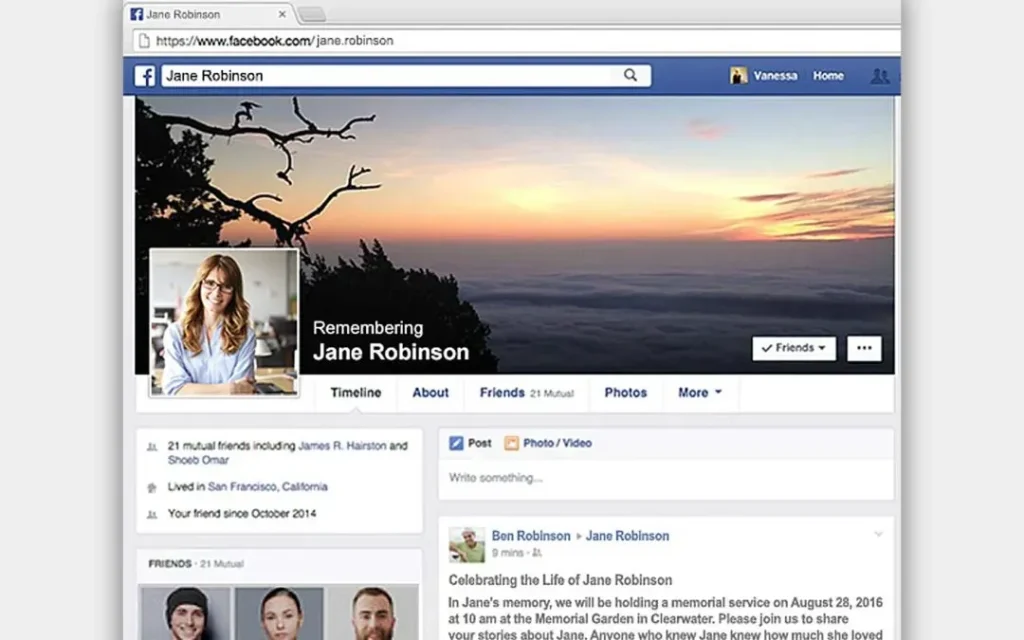Managing a deceased loved one’s Facebook account can be a sensitive and challenging task during a time of mourning. This task is crucial, not only for honoring their memory but also for protecting their digital legacy from potential misuse. Facebook provides two primary options for bereaved family members: memorializing the account to create a space of remembrance or requesting its complete deletion. A memorialized Facebook account allows friends and family to cherish the memories and interact while ensuring that the account is secure and managed by a trusted legacy contact. Understanding the Facebook memorialization process can help you navigate this emotional journey thoughtfully and respectfully.
When a family member passes away, dealing with their social media profiles can be an emotional yet necessary process. You may find yourself asking how to handle the online remnants of their life, particularly on platforms like Facebook. This is where options such as memorializing their account or deleting it come into play, allowing you to either preserve cherished memories or ensure that their digital footprint is effectively erased. Additionally, the role of a legacy contact can be pivotal in managing a deceased individual’s account, serving as a guardian of their online identity. Navigating this digital landscape provides an opportunity to reflect on their legacy while adapting to a life without their physical presence.
Understanding the Facebook Memorialization Process
Facebook’s memorialization process is an important step in managing a deceased loved one’s digital legacy. When Facebook receives notice of a user’s passing, they can transform the account into a memorialized profile, which serves as a testament to the person’s life and offers a space for remembrance among family and friends. This transition not only respects the memory of the deceased but also provides a secure area where loved ones can share memories, post tributes, and engage with the content the individual shared during their lifetime.
The fact that this profile is locked means that no unauthorized access can occur, protecting it from potential cyber threats. Memorializing an account requires that a family member or a previously designated legacy contact manages the account, ensuring that only those closest to the deceased can oversee their online presence.
How to Manage a Deceased Loved One’s Facebook Account Through Memorialization
To manage a deceased loved one’s Facebook account effectively, you can either choose to memorialize or delete the account. If opting for memorialization, it’s essential to fill out the Memorialization Request Form on Facebook, providing accurate information such as the deceased’s full name and date of death. Uploading proof of death, like a death certificate or obituary, is necessary to authenticate the request. This creates a digital memorial that friends and family can revisit, helping them to cherish and celebrate the life of their loved one.
Once the account is memorialized, only a legacy contact, if designated, will have the authority to manage it. This includes the ability to accept new friend requests, pin posts for visibility, and even manage the profile picture. This system is designed to ensure that the deceased’s wishes, concerning their digital legacy, are properly respected.
Requesting the Deletion of a Deceased Person’s Facebook Account
In addition to memorializing an account, family members may prefer to delete the account entirely to prevent any future misuse. This process is stricter and generally reserved for immediate family members or legal representatives. To delete a deceased person’s Facebook account, one must complete the Special Request for Deceased Person’s Account form, ensuring to select the deletion option and provide required documentation such as a death certificate and proof of relationship.
It’s important to note that once an account is deleted, all data contained within it is permanently lost. Thus, it’s essential to carefully consider whether memorialization might serve as a more fitting tribute compared to deletion, particularly if the deceased had a vibrant presence on the platform. This decision ultimately rests on the loved ones’ desires and respect for the deceased’s memory.
The Role of Legacy Contacts in Digital Memorials
Assigning a legacy contact is a proactive step that can facilitate the management of a deceased loved one’s Facebook account. A legacy contact is a person designated by the user to take care of their online profile after their passing, making the management process smoother. This contact can perform specific actions, such as pinning tribute posts and accepting friend requests, which keeps the account active and engaged, honoring the deceased’s memory.
However, it’s crucial to understand that a legacy contact cannot log into the account or read private messages, ensuring the deceased’s privacy remains intact. This role provides a balance between celebrating a life and maintaining security in the digital realm, allowing for a thoughtful and respectful way to manage social media accounts after a loved one is gone.
Exploring Other Options for Managing Digital Legacies
Beyond the memorialization and deletion processes, Facebook offers various additional tools to help manage a deceased person’s profile. For instance, verified family members can request a download of the deceased’s shared content, such as photos or posts, allowing families to preserve those precious memories in a tangible format. It’s a way of keeping their digital legacy alive, providing comfort during a time of grief.
Additionally, if no immediate family is available to manage the account, anyone can report an account that they suspect belongs to a deceased person for memorialization. This process assists in quickly transitioning the account to a memorial state, thus ensuring that unauthorized access is prevented promptly.
Safeguarding Your Loved One’s Digital Legacy
To protect a deceased loved one’s digital legacy, it’s essential to take comprehensive steps to ensure their online presence remains respected and secure. After a loved one’s passing, utilizing a password manager can greatly assist in handling their various accounts, enabling trusted contacts to gain access when necessary while also enhancing security. This kind of foresight can help prevent unauthorized use or ghost hacking that often targets deceased individuals’ profiles.
Moreover, implementing multifactor authentication across significant accounts increases security, providing an additional layer of protection against potential breaches. This proactive approach to digital legacy management is vital in today’s online environment, where threats to privacy and security are rampant.
The Emotional Aspect of Digital Legacy Management
Managing a deceased loved one’s Facebook account can also be an intensely emotional process. Navigating through their social media presence inevitably involves memories that can stir up feelings of loss and grief. For many families, memorialized accounts serve as an ongoing way to connect with their loved one, offering a space to cherish shared experiences and celebrate their life.
Families should engage in open discussions about how they wish to handle the deceased’s online presence. Topics might include whether to memorialize their accounts, who will be responsible for managing them, and what content should be preserved or deleted. Through these conversations, families can come to an agreement that honors and respects the memory of their loved one.
Educating Others About Digital Legacy Planning
As society increasingly incorporates digital aspects into everyday life, educating ourselves and our loved ones about digital legacy planning has become essential. Many people are unaware of how to manage their digital legacies, which can lead to confusion and additional sorrow during difficult times. Knowing how platforms like Facebook handle memorializations and deletions empowers families to make informed choices.
Furthermore, encouraging discussions about assigning legacy contacts and preparing digital wills can significantly ease the stress associated with managing accounts after a loved one passes. By being proactive about digital legacies, individuals can ensure that their preferences are respected and that their families have the tools they need to handle their online presence thoughtfully.
Conclusion: Respecting Digital Legacies
In conclusion, managing a deceased loved one’s Facebook account is a significant responsibility that requires thoughtful decision-making. Whether you decide to memorialize the account or delete it, both actions demand an understanding of the procedures in place and the emotional weight they carry. Recognizing the importance of safeguarding digital legacies not only protects the deceased’s memory but also helps families process their grief.
Ensuring that any action taken aligns with the wishes and values of the individual can turn a painful task into an opportunity for honor and remembrance. By respecting digital legacies, we keep the memory of our loved ones alive in a manner that reflects their lives and contributions.
Frequently Asked Questions
What does it mean to manage a deceased loved one’s Facebook account?
Managing a deceased loved one’s Facebook account involves either memorializing or permanently deleting the profile after they pass away. Memorialization transforms the account into a digital tribute, while deletion removes the account from Facebook permanently.
How can I request the memorialization of my deceased loved one’s Facebook account?
To request memorialization, fill out the Memorialization Request Form on Facebook, provide the deceased’s full name, date of death, and upload proof of death such as an obituary or death certificate.
What is the Facebook memorialization process?
The Facebook memorialization process involves verifying the death of the user and marking the account as ‘Remembering.’ Friends and family can then share memories, while the account is secured against unauthorized access.
How do I delete my deceased loved one’s Facebook account?
To delete a deceased loved one’s Facebook account, submit a request via the Special Request for Deceased Person’s Account form. You’ll need to provide a death certificate and proof of your relation to the deceased.
What is a legacy contact on Facebook?
A legacy contact is someone designated by the user who can manage their memorialized Facebook account after they pass away, including accepting friend requests and updating profile details.
Can anyone manage a memorialized Facebook account?
No, only the designated legacy contact or verified immediate family members can manage a memorialized Facebook account. This ensures proper management and respect for the deceased’s digital legacy.
What should I do if I can’t access my loved one’s memorialized Facebook account?
You cannot log into a memorialized Facebook account. If you need information or access, consider requesting a copy of content from Facebook using the appropriate channels for verified family members.
Why is it important to manage a deceased loved one’s Facebook account?
Managing a deceased loved one’s Facebook account is crucial to protect their digital legacy from potential misuse and to allow friends and family to remember and honor their life safely.
Can I still share memories on a memorialized Facebook account?
Yes, friends and family can share memories, post tributes, and interact with the memorialized account, all of which contribute to celebrating the loved one’s life.
What steps can I take to protect my loved one’s digital legacy?
To protect a loved one’s digital legacy, use a password manager, enable multifactor authentication, assign legacy contacts, maintain an updated account list, and regularly review your digital legacy plan.
| Key Point | |
|---|---|
| Memorialized Facebook Account | Turns into a tribute space; only visible to verified family or legacy contact. |
| Request Memorialization | Submit a form with proof of death; Facebook reviews the request. |
| Request Account Removal | Only immediate family can request; needs documentation like death certificate. |
| Legacy Contact | Contact can manage the memorial; cannot log in or read messages. |
| Protect Digital Legacy | Use a password manager and multifactor authentication; designate emergency contacts. |
Summary
To manage a deceased loved one’s Facebook account, it’s essential to know the available options for memorialization or deletion. Facebook allows you to either turn the account into a memorialized page, which honors the individual’s memory, or you can opt for its permanent removal if you are an immediate family member. Acting promptly is crucial to protect their digital legacy and prevent potential misuse. By understanding these steps, you can navigate this challenging process with care and respect for your loved one.



